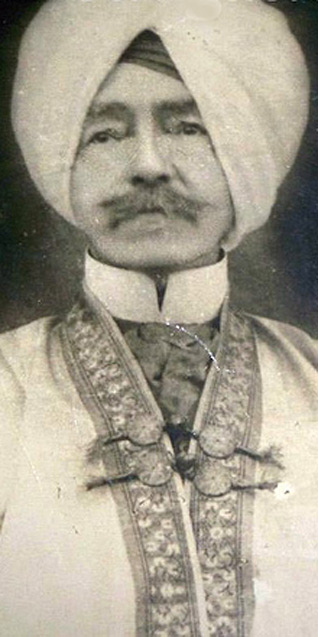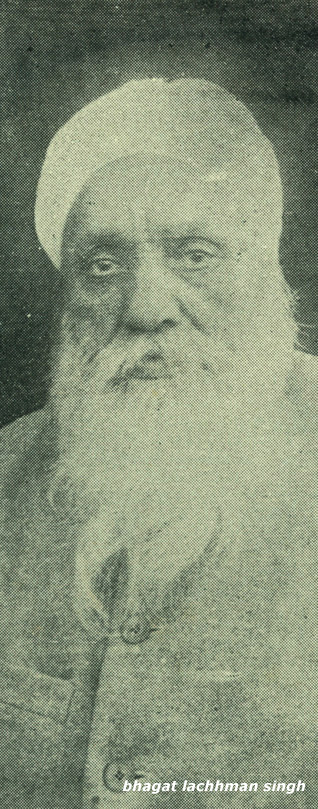Our Heroes
Against All Odds - The Seva of a Gurmukh:
Max Arthur Macauliffe
TEJA SINGH
MAX ARTHUR MACAULIFFE
[11 September 1838 - 15 March 1913]
This year we celebrate his 100th death anniversary.
With the co-operation of Bhagatji [Bhagat Lachhman Singh] a plan was made to establish a memorial to Mr Macauliffe.
Bhagatji was one of those who had helped Macauliffe. The latter had a great respect for Sikh beliefs, but for information
about the scriptures and history he constantly sought help from Bhagatji, Bhai Kahn Singh, and many gianis / interpreters of Amritsar.
While Macauliffe was working on his translations, he could not persuade the gianis who assisted him to rise above their narrowly communal views. With the help of Bhagat ji and Bhai Kahn Singh, however, he was able to reflect the high ideals of Sikhi.
Yet, his hard work was not valued at that time. When it became known that he was going to publish an English translation of the Guru Granth Sahib, they made a great fuss.
"This is blasphemy!" they cried. "Stop it at once!"
They also asserted that if he published his translation of the Guru Granth Sahib in book form, they would demand that the Government should ban it. This meant that Macauliffe had to change his original plan. He attached selected passages from scripture to the biographies of the individual Gurus and published the complete work in six volumes, working on the project from 1880 to 1909.
Its appearance created a considerable rumpus in Sikh circles.
Macauliffe began the venture inspired and he naturally expected assistance from the Lahore Khalsa Diwan. He gave up his high post [in British service, as a Divisional Judge, in 1893] and devoted his entire life [to the study of Sikhism]. All the leaders of the Lahore Khalsa Diwan died one by one and then the [Punjab] Government did not keep its word.
At the beginning [of the project] it had promised a subsidy of £1,000 (Rs 15,000), yet when the work was published it was unwilling to pay more than Rs 5000.
In 1911 when Macauliffe went to Rawalpindi to attend the Sikh Educational Conference nobody turned up at the railway station to receive him. He hired a tonga (horse buggy) and arrived at the cottage of Bhagat ji who was surprised to see him. The
telegram which Macauliffe had despatched had failed to reach him. They spent the whole night talking.
Macauliffe told him that the Government had turned its back on him and now he could rely only on the Sikhs.
"I've declined to take government funds," he said. "I won't ask the Sikhs for money either. I just want the Conference to pass a resolution appreciating my work and recommending that Sikhs should buy the book."
Bhagatji replied, "There will be no difficulty about that. Tomorrow I'll move the resolution in the Subjects Committee and get it carried."
The next day Bhagat ji had to tell Macauliffe that the resolution was not passed.
Hearing this Macauliffe's heart was broken and [leaving the Punjab] he returned to his [own] country.
Macauliffe died soon afterwards [of cancer in 1913].
Even in death his corpse was dishonoured. Christians said that as he was not a Christian he could not be given last rites and buried. Some Sikhs present in London at that time said that as he was not a keshadhari he could not be cremated. At last it was decided that his body should be lowered in the grave for five minutes and then cremated. This is what Bhagat ji told me.
Together with Bhagat ji I started a "Macauliffe Memorial Fund" in Rawalpindi, exhorting the Panth to establish a central library in memory of one who had served it so nobly.
In spite of our numerous appeals we could gather only Rs 2000, too meagre an amount to establish a library. After some time I moved to Amritsar [to join Khalsa College] and donated the money to the College.
Now a medal worth Rs 100 is given every year for essay-writing.
[This essay, originally written in Punjabi, was published in Prof Teja Singh's autobiography, Arsee, Sikh Publishing House, Amritsar, 1952. It was translated by Amarjit Singh Chandan, and edited by W.H. McLeod.]
February 9, 2013
Conversation about this article
1: Sangat Singh (Kuala Lumpur, Malaysia), February 09, 2013, 8:17 PM.
What a parochial way to treat such a great man as Macauliffe who gave his entire life and a distinguished career for the Sikhs. In 1954 when I left for the shores of Singapore / Malaysia, the only set of books I carried with me were "The Sikh Religion" in 3 copies covering 6 volumes. These were printed in the UK by OXFORD AT THE CLARENDON PRESS. The shabad it had for a preamble and invocation was: "footey aanda bharam ka maneh bhayo pargaas / kaati bayrri pageh tay gur keeni bund khalaas" [GGS:1002.15]. In his own translation, Macauliffe cited: "The egg of superstition hath burst; the mind is illumined; The Guru hath cut the fetters off the feet and freed the captive." I read somewhere, most probably on sikhchic.com itself, that at the time of his passing away in 1913, his death was witnessed by his 'khitmatgar', a Muslim valet who had followed him from India to continue serving him. According to him, Macauliffe recited Japji Sahib appropriately before breathing his last: "Nanak tay mukh ujlay kayti chhutti naal" [GGS:8.12] - "O Nanak, their faces are radiant in the Court of Waheguru; and many, inspired by the actions, are saved along with them." Sher ji, you already have the Macauliffe Manor, a hermitage ever to remain a thankful place of peace and meditation, keeping the flame alight. May it turn into a blazing flame.
2: Baldev Singh (Bradford, United Kingdom), February 09, 2013, 8:38 PM.
Incredible article! Max Arthur Macauliffe was able to cut through and see true Sikhi sans the curse of Hindu corruption!
3: A D Singh (Gurgaon, India), February 11, 2013, 7:24 AM.
Very sad, but who to blame. In the name of Sikhi, many still delve in narrow-mindedness and superstition. If we are to spread the message of Nanak, we are to shed all the constraints and welcome all without prejudice of caste, creed, etc., and with love.




